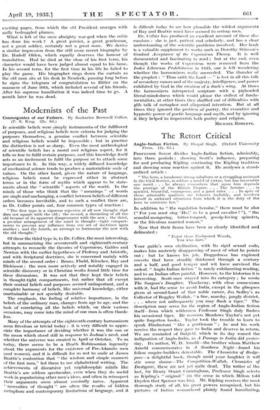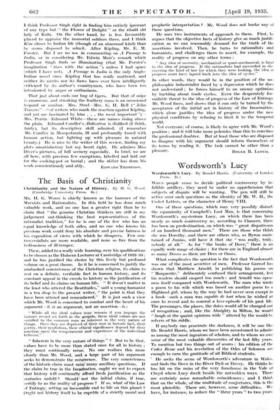The Retort Critical PROFESSOR SING!! divides Anglo-Indian fiction, admirably, into
three periods : showing Scott's influence, preparing for and producing Kipling, continuing the Kipling tradition and showing some reaction against it. He analyses a stand- ardized article :
" The hero, a handsome strong subaltern or a struggling assistant in the Civil Service, is seldom a model of virtue, but has invariably one merit . . . he always remembers that upon him depends the prestige of the British Empire. . . . The heroine . . . is spirited, beautiful, courageous, and a good rider. . . . In spite of these admirable qualities she behaves foolishly, and involves herself in awkward situations from which it is the duty of the hero to extricate her."
In addition to " the regulation heroine," there must be also (" For you must sing ' Ho !' to be a good cavalier ! "), " the scandal-mongering, bitter-tongued, gossip-loving spinster, or the frivolous married woman."
Now that their fauna have been so clearly identified and delineated :
" Enter these Enchanted Woods, You who dare."
Your guide's own civilization, with its rigid sexual code; makes him austerely disapproving of most of what he points out ; but he knows his job. Doggedness has explored coverts that have steadily thickened through a century and a half, and good temper and wit have survived the ordeal. " Anglo-Indian fiction " is rarely exhilarating reading, and to an Indian often painful. However, to the historian it is interesting. Scott once strayed into its category ; he wrote The Surgeon's Daughter. Thackeray, with close connexions with it, had the sense to avoid India, except in the glimpses given at second-hand of that noble career, Jos Sedley's as Collector of Boggley Wollah, " a fine, marshy, jungly district. . . . where not unfrequently you may flush a tiger." The description may serve for the region of Anglo-Indian fiction itself—from which wilderness Professor Singh duly flushes his occasional tiger. He recovers Meadows Taylor's not yet qUite forgotten books. Taylor took the trouble to learn to speak Hindustani " like a gentleman " ; he and his work receive the respect they gave to India and deserve in return. We are reminded of Oakfield, which in its day roused the indignation of Anglo-India, as A Passage to India did yester- day. Its author, W. D. Arnold—the brother whom Matthew Arnold commemorates in A Southern Night—found his fellow empire-builders detestable. The Chronicles of Budge- pore—a delightful book, though amid your laughter it will stir some shame—The Competition-Wallah, Chronicles of Dustypore, these are not yet quite dead. The writer of the last, Sir Henry Stuart Cunningham, Professor Singh selects as Kipling's " original " (in the sense in which Milton told Dryden that Spenser was his). Mr. Kipling receives the most thorough study of all, his great powers recognized, but his pictures of Indian womanhood plainly found humiliating. I think Professor Singh right in finding him entirely ignorant of any type but " the Flower of Delight " or the ribald old lady of Kulu. On the other hand, he is less favourably placed to appraise the immortal soldiers three, and I think Kim closer to Indian life (though of an abnormal kind) than he seems disposed to admit. After Kipling, Mr: E. M. Forster. But I see no use in commenting on A Passage to India, or in considering Mr. Edwin Muir's remark which Professor Singh finds so illuminating (that Mr. Forster's imagination " rises with the action ") unless I had space (which I have not). A Passage to India is the 01113- Anglo- Indian novel since Kipling that has really mattered, and neither its merits nor its flaws have ever been intelligently- criticized by its author's countrymen, who have been too intoxicated by anger or enthusiasm.
That just about ends our bag of tigers. But that of snipe is enormous, and streaking the feathery mass is an occasional leopard or sambur. Mrs. Steel—Mrs. G. H. Bell (" John Travers "--" of writers who mark the reaction against Kipling, and yet are fascinated by him . . . the most important ")---- Mrs. Perrin—Edmund White—these are names rising above the plain. Edmund Candler's Abdication is disliked (I think, fairly), but its descriptive skill admired. (I remember Mr. Candler in Mesopotamia, ill and profoundly bored with human action, but lighting up with pleasure in natural beauty.) He is nice to the writer of this review, finding my plots unsatisfactory but my heart right, He admires Miss Diver's pictures, of hill scenery especially. In brief, we are all here, with precious few exceptions, labelled and laid out for the cooking-pot or burial ; and the shikar has done his







































 Previous page
Previous page